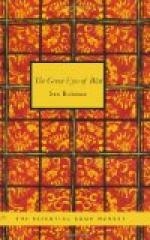I heard the door-bell ring, and I heard Coates’s regular tread as he proceeded along the passage. There was a brief, muttered colloquy, a rap on the study-door, and Coates entered.
“A sergeant of police and a constable, sir, to see Inspector Gatton!”
Damar Greefe raised his thin, yellow hand. His voice, when next he spoke, exhibited no trace of emotion.
“Let them be told to wait,” he said. “I have not finished.”
It was wildly bizarre, that scene in my study, with the dignified white-haired Eurasian doctor, palpably laboring against some deathly sickness, sitting there unperturbed, his brilliant, perverted intellect holding him aloof from the ordinary things of life—whilst those who came to hale him to a felon’s cell waited in the ante-room!
I glanced swiftly at Gatton, and he nodded impatiently.
“Let them stay in the dining-room, Coates,” I said. “Make them comfortable.”
“Very good, sir.”
Unmoved, Coates withdrew—and I saw Gatton glance at his watch. Throughout the latter part of his strange narrative, neither Gatton nor I interrupted the narrator, therefore I give his story, so far as I remember it, in his own words. He no longer addressed either of us directly; he seemed, indeed, to be thinking aloud.
CHAPTER XXVI
STATEMENT OF DR. DAMAR GREEFE (CONTINUED)
As I walked along through the deserted native streets, for the hour was late, I reviewed mentally the circumstances of that affair, already several months old, to which I have referred. Since it proved to have a very important bearing upon my own life and unfortunately the lives of many others, I will briefly recount it here.
Sir Burnham and Lady Coverly, having arrived at Port Said, were proceeding by rail to Cairo when an accident farther up the line necessitated their breaking their journey at Zagazig.
Now, for a time in the spring of the previous year, I had devoted much labor to an inquiry in this place, which stands of course roughly upon the site of the ancient Egyptian city of Bubastis. In those myths, or so-called myths, of the Ancient Egyptian religion which represented the various attributes of man in the guises of animals, I had perceived a nucleus of wisdom pointing to the possibility that the law which I had so laboriously established might have been known to the early Egyptian priesthood. Indeed I was partly induced to inquire into the myths of Bast, the cat-headed goddess to whom of old this town was dedicated, by the following two things: first, a chance reference in the pages of Herodotus; and, second, a persistent superstition that during a certain season of the year, psycho-hybrids occurred in this town.
By dint of close research I discovered that the date favored by the inhabitants of Zagazig, as that upon which such creatures were born there, corresponded very closely with the Sacred Sothic month, formerly sacred to Bast, the titulary goddess of the place, corresponded in short with the ancient Feast of Bast.




